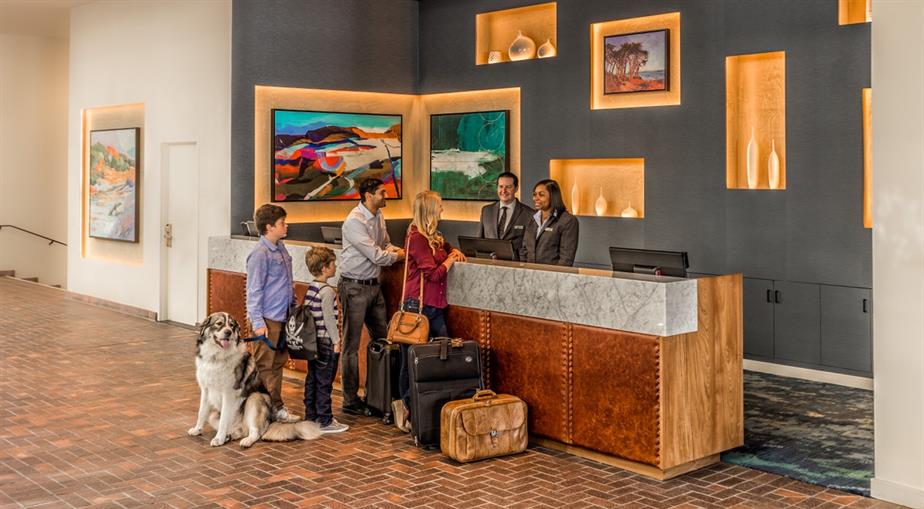If you’re considering buying a hotel, but haven’t personally worked extensively in the hospitality industry, there are a lot of factors you’ll want to become familiar with before moving ahead with your entrepreneurial dream. Even if you have worked in a hotel setting before, it pays to include the advice of experienced colleagues in your research efforts. That’s the purpose behind our “Be the Boss” series.
In this case, we had the opportunity to speak with Janine Chicourrat, General Manager of the Portola Hotel and Spa, a Four Diamond Hotel in Monterey, California. With over 30 years of experience heading up operations in hotels of various sizes, Chicourrat’s insights add value for brand new owners and managers alike, whether you’re looking to run a small boutique hotel or a 400-room golf resort. And even if your goal is to own the property but hire a general manager to handle the day-to-day operations, getting an accurate view from the trenches can inform your efforts going forward.
The skills needed to run a successful hotel
When we asked Chicourrat what skills are most important for someone to succeed running a hotel, she described six different buckets into which a range of necessary skills could fall:
- People skills - “Obviously, if you’re in the hospitality business, you’re going to be dealing with people day in and day out, so people skills are the start of everything.” She noted that this need goes beyond just showing guests excellent customer service, but involves the ability to switch quickly and effectively from dealing with guests to staff to vendors to government officials… all at the drop of a hat if necessary.
- Financial skills - “I think the financials are the most important thing for a prospective hotel buyer to consider upfront. Understand what you’re buying and what the true potential is in the local market. And be realistic about what you’re going to be able to accomplish when it comes to consistent ROI.” Like any other business, the bottom line matters at the end of the day, and the figures are higher in the hotel business than in most.
- Legal skills - “Hotel owners have to work hand-in-hand with local and state government because it’s a highly regulated industry.” Government takes a keen interest in the hospitality industry because hotels and resorts form a key part of the area’s tourism and business infrastructure. Hotel owners and general managers do well to fully research the local and state regulatory situation and determine how they can best cooperate with — and gain the cooperation of — the government.
- Multitasking skills - “I’ll often joke with people that this is a great job for someone with ADD…” Over the course of a typical day, the average hotel owner or general manager is likely to face dozens of different meetings, conversations, and “fires to put out,” all of which may require various facets of their skills, experience, knowledge, and personality. It’s rare for one matter to be neatly resolved and put away before the next comes to your attention, so effective multitasking is simply a necessary part of the job.
- Marketing skills - “Being proactive about keeping our occupancy rate as high as possible is always one of my most important responsibilities.” Although the owner or general manager will likely have one or more team members handling the hotel’s marketing activities (except in the smallest of operations,) keeping their finger on the pulse of those efforts at all times is key to ensuring the property can thrive now and in the future.
- Leadership skills - “As a manager, it’s helpful to understand how everything works, but it’s even more important to surround yourself with a team of experts who you can trust to handle their departments for you.” To ensure that all the moving parts inherent in running a successful hotel work together flawlessly, effective training, coaching, and delegation are vital. It’s far more important to have an expert on your team that you can trust than to be an expert yourself.
The challenges a hotel owner or general manager can expect to face
Chicourrat noted that challenges can appear almost anywhere and at any time in the normal course of running a busy hotel. However, there are a few areas that tend to produce more of these challenges than others, and deserve special attention.
- Human resources - “You’re working every day with such a diverse group of people, and everyone you speak to has their own unique needs or requirements.” Whether it’s a disgruntled guest, an inexperienced employee, or a repairman handling an unanticipated service, you’ll need to be able to switch gears and work effectively to resolve whatever issues they’re facing.
- Outside impacts on occupancy and customer satisfaction - “Right now, [at Portola] we’re in the midst of a major renovation project. As much as we try to get the word out, we’re sometimes limited in what we can publish on many of the online booking sites. As a result, guests will sometimes arrive and be upset that there’s renovation going on they didn’t know about.” This is just one example of a larger problem facing all hotel owners: from online reviews to changes in the local business climate to immigration laws being overhauled, there are many factors outside your control that can have a direct impact on your business success.
- Seasonality - “Occupancy rates will naturally change, not just seasonally, but even week to week, and year over year.” The most successful hotels and resorts will have to overcome this unpredictability and maintain a healthy occupancy rate consistently over time through strategic marketing and sales efforts along with cultivating repeat business by delighting customers.
What does a “typical day” look like as General Manager of a large resort hotel?
While “typical day” is really a misnomer in this business, Chicourrat was able to provide a basic framework that she tries to use to organize her daily activities.
- Daily walkthrough - “I generally start my day with a walkthrough of the property, touching base with the various departments and just making sure there aren’t any big fires that need to be put out first thing.” Being visible to the staff and guests in this way offers benefits beyond the practicality of visually inspecting the premises, as it shows you are both interested and approachable.
- Arrivals and departures - “Next, I’ll review the day’s list of arrivals and departures so I can have a basic idea of who’s coming and going that day. If any large groups are involved, or if there are meetings being held, I want to refresh myself about them before people begin showing up.”
- Departmental meetings - “I have six different department heads who all report directly to me, and we’ll generally meet at least once a day (whether formally or informally) to make sure I’m up to speed on how things are going in their department, what needs they have, and the like.” Depending on the size operation you’re considering buying, this arrangement will be necessarily more or less involved, but the important thing is to make sure, as owner or manager, you’re aware of every team’s status and needs, but you’re NOT personally responsible for absolutely every decision being made.
- Other requirements in the schedule - “As General Manager of a large resort hotel, I also do a lot of community outreach. For instance, I sit on several boards, so I may have board meetings to prepare for and attend.” Being involved in the community is important for hotel leadership, since a successful hotel is a large local employer and is so deeply ingrained in the success of other surrounding businesses. Whatever other responsibilities fill your schedule, you’ll need to continually prioritize and make sure the most important things are getting done.
Advice for prospective hotel owners and general managers
Chicourrat again emphasized a few points made above to stress the importance of these two aspects of owning and running a successful hotel.
- Financial knowledge and skill - “The most important thing for someone new to owning or running a hotel is to thoroughly understand the financial side of the business and to be realistic about how you’re going to handle finances from the initial planning phases on.” Without doubt, a poorly executed financial strategy can spell a disastrous end to an otherwise promising hotel development plan, and the tables can turn very quickly considering the relatively large upfront investment most hotel purchases will require.
- Understanding the labor market and human resources - “Changes in immigration law, labor law, and the like, are going to have a huge impact on your operation.” Your staff is the lifeblood of your hotel, not only because they represent a significant portion of your operating expenses, but even more so because you’ll need to rely on a high-quality team of self-managed employees to help you keep your hotel running smoothly and delighting your guests. You’ll need to proactively stay on top of anything that could potentially affect your hiring and development processes and be sure to make whatever changes are necessary to optimize your staff accordingly.
We certainly appreciated the opportunity to speak with Janine Chicourrat, General Manager for the Portola Hotel and Spa, and a 33-year veteran in the hospitality industry. Remember, if you’re interested in buying a hotel or want to learn more about how to run a successful hotel or resort, BusinessesForSale.com is the place to be. You can check out our deep catalog of informative articles on buying and running a hotel, or review the listings of current hotels for sale right now.



